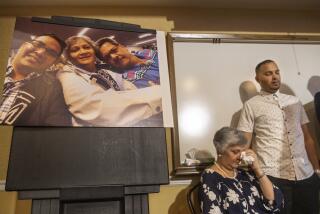Jury Deadlocks Over Execution in Burn-Death Case
- Share via
SANTA ANA — A mistrial was declared Tuesday after a jury deadlocked over whether a 34-year-old former janitor should be executed for dousing a bookkeeper with gasoline and burning her to death in a dispute over a paycheck.
After about five days of deliberation, jurors said they were deadlocked 10 to 2 in favor of sentencing Jonathan D’Arcy to death for the 1993 slaying of Karen Marie LaBorde in her Tustin office.
Deputy Dist. Atty. Robert Molko said prosecutors will decide in coming weeks whether to seek another trial to determine a penalty for D’Arcy. The mistrial does not affect the jury’s previous finding that D’Arcy is guilty of first-degree murder, torture and mayhem.
One of the jurors who held out for a life sentence without parole said he was swayed by psychiatric testimony that D’Arcy was brutalized as a child and suffers severe mental problems.
Kal Dunzo said D’Arcy’s only appearance during the trial, to read jurors poetry and share personal stories, only confirmed his belief the defendant’s mind was “defective.”
“To me, there was enough mitigating circumstances not to give him death,” Dunzo said.
Jurors voting for death said they believed D’Arcy’s actions, including a hunger strike in jail, were “manipulations.” Several jurors said D’Arcy might have mental problems, but they believed he knew what he was doing when he planned and carried out one of the most horrendous deaths possible.
“We know how much suffering Mrs. LaBorde” endured, said jury forewoman Dora Taylor. “That’s what was so hard for us to get over.”
The deadlock Tuesday capped a trial that has been unusual from the start.
D’Arcy began a hunger strike Nov. 13 to protest the way his defense was being handled. He refused to attend most of his trial, appearing only once when his court-appointed lawyer sought to give jurors a personal glimpse of the man whose fate they were charged with deciding.
D’Arcy again refused to attend court proceedings Tuesday and has declared he will continue a hunger strike until his concerns about his case are addressed.
Another judge has ordered that jail medical officials force-feed D’Arcy as needed to prevent disruptions in the case.
Relatives of the victim, who attended much of the trial, were not in court Tuesday when Superior Court Judge Robert R. Fitzgerald declared the mistrial in the penalty phase.
At D’Arcy’s request, his mother and relatives, who denied allegations that he was abused as a child, declined to attend the trial or testify.
Defense attorney George A. Peters had urged jurors to sentence D’Arcy to life in prison without parole, citing the defendant’s long history of paranoia-type problems.
The prosecutor urged a death sentence, alleging D’Arcy was seeking revenge over a paycheck he thought was being withheld from him when he doused LaBorde, 42, with gasoline and set her on fire with a cigarette lighter on Feb. 2, 1993.
LaBorde, who worked for a Tustin building maintenance company that employed D’Arcy, suffered severe burns over most of her body and died about eight hours later.
The victim, moaning in agony in a hospital emergency room, described what D’Arcy had done with the gasoline and cigarette lighter. Her tape-recorded statement to police was played at the murder trial.
The statement revealed a cruel irony: D’Arcy’s paycheck was his for the asking.
“He made a mistake,” she said. “I didn’t hold his money.”
Throughout the trial, D’Arcy objected to his lawyer using evidence of his mental problems as a defense. He contended that evidence showed that a space heater had ignited the fire, and has said he threw gasoline on the woman only to scare her into paying him.
The prosecution countered by pointing to the victim’s own dying declaration, and an arson expert testified that only an open flame, such as one from a cigarette lighter, could have ignited her.
Before the trial started, Peters failed in an attempt to have D’Arcy declared mentally incompetent to stand trial, describing his client as “irrational and incapable of cooperating” with his defense.
D’Arcy opted to keep his lawyer rather than represent himself as he had at hearings before the trial--a rarity in a capital case--but announced the hunger strike at that time.
More to Read
Sign up for Essential California
The most important California stories and recommendations in your inbox every morning.
You may occasionally receive promotional content from the Los Angeles Times.










